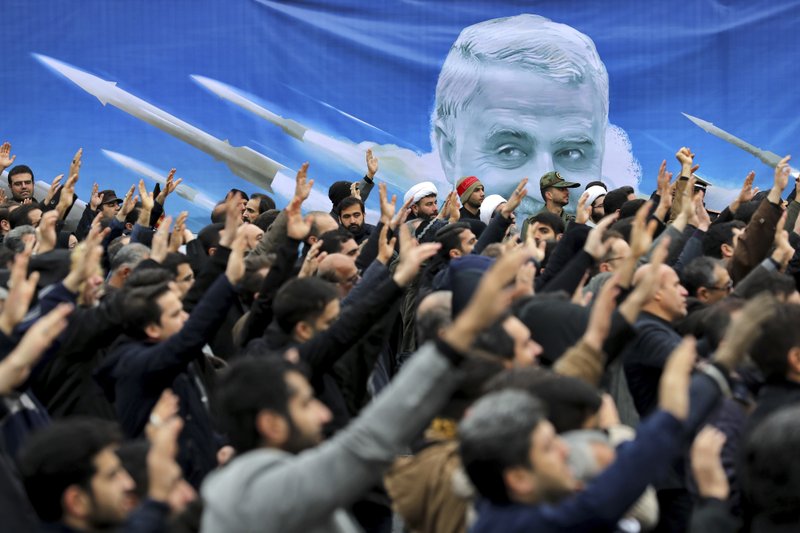The decision by the Trump administration last week to target and kill Iranian Gen. Qassem Soleimani marks the latest blow to allied trust in the United States, and the damage could prove challenging to repair, according to experts.

U.S. President Donald Trump ordered a drone strike on Jan. 3 to kill Soleimani, who was Iran’s top general and widely credited as the architect behind Iran’s efforts to expand its influence across the Middle East. That strike killed the general and others en route from the airport in Baghdad, Iraq.
Wait, There’s More: The aftermath of the killing of Qassem Soleimani
Allies were reportedly given no advance notice of the strike, including those with troops and personnel on the ground in the Middle East.
And as Trump continues to publicly muse about attacking Iranian cultural landmarks — which would constitute a war crime — allies including the U.K., France, Germany and Canada are calling for restraint as concerns grow about how Iran could retaliate to the targeted killing.
“At the working level, relations between the U.S. and its allies remain very good,” said Stephanie Carvin, assistant professor of international relations at the Norman Paterson School of International Affairs at Carleton University.
“At the higher level, I think there’s a growing concern about U.S. behaviour and the lack of consultation.”
Responses issued by allies since the strike have called for de-escalation of the conflict.
Canadian Foreign Affairs Minister Francois-Philippe Champagne put out a statement highlighting the need for “all sides to exercise restraint” and made a point of noting that Canada has held longstanding concern about the “aggressive actions” of Soleimani.

Get daily National news
His counterpart in the U.K. warned against conflict with Iran, calling it “in none of our best interests.”
Germany called the attack a “dangerous escalation.”

But the head of the British Parliament’s foreign affairs committee offered a biting criticism of the attack, one that struck at the root of many of the questions being raised about Trump’s decision to take unilateral action without notifying allies.
“The purpose of having allies is that we can surprise our enemies and not each other,” said Tom Tugendhat in an interview with the BBC.
Steve Saideman, who holds the Paterson Chair in International Affairs at Carleton University, also suggested the targeted killing has hurt trust in the U.S. for its allies and that the responses by many to its move say a lot.
“They’ve come to realize the U.S. is not a reliable ally and they’re not going to stick their necks out for the U.S.,” he said.
“The fact they haven’t jumped to the U.S. side, that’s telling.”
Former Canadian diplomat Colin Robertson said he’s not so sure the move itself will damage trust, given the precedent for keeping such actions secret from allies in cases where leaks may be feared.
Elliot Tepper, emeritus professor of international affairs at Carleton University, agreed that while it is normal for such decisions to be taken without advance warning to allies in such cases, it’s also customary that allies with people on the ground who could be hurt or targeted be given a heads up.
Tepper, however, suggested that allies will likely hold off on wading further into the mire for now, until they have a clearer sense of what will happen next.
“It’s going to be a wait-and-see situation in the immediate future.”
U.S. Secretary of State Mike Pompeo appeared to express frustration with the responses from allies, claiming the killing saved American and European lives and that allies voicing concern were not being as “helpful as I wish that they could be.”
That frustration is likely being similarly felt by allies worried about having few voices left in the U.S. administration who understand and value them.
“A lot of those people who were around him, who understood the value of alliances, are gone,” said Carvin, pointing to figures like John Kelly, Trump’s former chief of staff, and former defence secretary and respected retired military general James Mattis.
“That’s a huge problem because you can’t trust anyone.”
Mattis resigned in December 2018 in response to a decision by Trump to pull American soldiers out of Syria — a move the president made without consulting any of the U.S. allies also involved in the response to the ongoing civil war in that country and the spread of the so-called Islamic State terrorist group.
Two days after that withdrawal was ordered last year, Turkey invaded northern Syria and attacked Kurdish forces, key Western allies in the fight against ISIS in the region who Trump was promptly accused of abandoning.
In November 2019, the U.S. Department of Defence watchdog said in a report to Congress citing American intelligence that ISIS used that Turkish invasion and the U.S. withdrawal to recalibrate its resource networks and its abilities to plot attacks abroad.
That same report said ISIS is now resurgent.









Comments